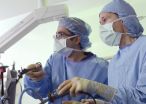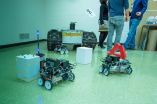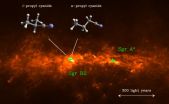(Press-News.org) Washington, DC (September 25, 2014) — Kidney transplant recipients infected with BK virus are more likely to develop antibodies against their kidney transplants than uninfected patients, according to a study appearing in an upcoming issue of the Journal of the American Society of Nephrology (JASN). Future treatment strategies should focus on simultaneously clearing BK infections while protecting against risks of transplant rejection.
Many people are infected with BK virus, and it rarely causes disease. However, for transplant recipients and others who take immunosuppressive drugs, it can be problematic. The most common approach to BK infection in transplant patients is to reduce their anti-rejection medications so that their immune systems can fight off the infection. This of course could compromise the health of their transplanted organ.
Deirdre Sawinski, MD (Perelman School of Medicine at the University of Pennsylvania) and her colleagues looked at the health of 785 kidney transplant recipients, 132 of whom who had persistent BK infections despite reducing their anti-rejection medications.
While there was no significant difference in terms of patient or kidney transplant survival after a median of 3 years, patients with BK infections were more likely to develop antibodies against their kidney transplants. Such donor-specific antibodies are known to be detrimental to the survival of transplanted organs.
"This study is the first to link 2 common complications of kidney transplantation, namely BK viremia and donor-specific antibodies," said Dr. Sawinski. "However, we cannot comment on the exact mechanism by which BK viremia predisposes patients to the development of donor-specific antibodies."
INFORMATION:
Study co-authors include Kimberly Forde, MD MSCE, Jennifer Trofe Clark, Pharm D, Priyanka Patel, BS, Beatriz Olivera BS, Simin Goral, MD, and Roy Bloom, MD.
Disclosures: The authors reported no financial disclosures.
The article, entitled "Persistent BK Viremia Does Not Increase Intermediate-Term Graft Loss But is Associated with De Novo Donor Specific Antibodies," will appear online at http://jasn.asnjournals.org/ on September 25, 2014.
The content of this article does not reflect the views or opinions of The American Society of Nephrology (ASN). Responsibility for the information and views expressed therein lies entirely with the author(s). ASN does not offer medical advice. All content in ASN publications is for informational purposes only, and is not intended to cover all possible uses, directions, precautions, drug interactions, or adverse effects. This content should not be used during a medical emergency or for the diagnosis or treatment of any medical condition. Please consult your doctor or other qualified health care provider if you have any questions about a medical condition, or before taking any drug, changing your diet or commencing or discontinuing any course of treatment. Do not ignore or delay obtaining professional medical advice because of information accessed through ASN. Call 911 or your doctor for all medical emergencies.
Founded in 1966, and with more than 14,000 members, the American Society of Nephrology (ASN) leads the fight against kidney disease by educating health professionals, sharing new knowledge, advancing research, and advocating the highest quality care for patients.
Viral infection in transplant recipients increases risk of developing damaging antibodies
Such antibodies may increase the risk of rejection
2014-09-26
ELSE PRESS RELEASES FROM THIS DATE:
Not all Hispanics are the same when it comes to drinking
2014-09-25
Hispanics are often grouped into a single category when it comes to alcohol use. Yet a new Michigan State University study indicates that the risk of alcohol abuse and dependence can vary significantly among different subgroups within the population.
Using pre-existing national data which looked at the incident rate of alcohol use disorders, or AUDs, over a period of time, Carlos F. Ríos-Bedoya, an assistant professor in the College of Human Medicine, is the first to determine that the annual incidence rate isn't the same among all Hispanics and prevention efforts shouldn't ...
Gastric bypass bests banding for weight loss, diabetes, high blood pressure and cholesterol control
2014-09-25
DALLAS – Sept. 25, 2014 – Gastric bypass surgery has better outcomes than gastric banding for long-term weight loss, controlling type 2 diabetes and high blood pressure, and lowering cholesterol levels, according to a new review by UT Southwestern Medical Center surgeons of nearly 30 long-term studies comparing the two types of bariatric procedures.
The review, appearing in JAMA, found that those undergoing gastric bypass operations lost more weight — an average of 66 percent of their excess weight, compared to 45 percent average excess weight loss for those undergoing ...
Bariatric surgery not a magic wand to curb depression
2014-09-25
Most severely obese people experience much better spirits once they shed weight through a diet, lifestyle changes or medical intervention. This is unfortunately not true for everyone, says Valentina Ivezaj and Carlos Grilo of the Yale University School of Medicine in the US. In an article in Springer's journal Obesity Surgery, the researchers advise that the levels of depression in patients be measured six to 12 months after they have had such bariatric surgery. This will ensure that the necessary help can be provided when needed.
Ivezaj and Grilo set out to investigate ...
Long-term unemployed struggle as economy improves, Rutgers study finds
2014-09-25
NEW BRUNSWICK, N.J. – While the unemployment rate for people out of work for six months or less has returned to prerecession levels, the levels of unemployment for workers who remain jobless for more than six months is among the most persistent, negative effects of the Great Recession, according to a new national study at Rutgers. In fact, one in five workers laid off from a job during the last five years are still unemployed and looking for work, researchers from the John J. Heldrich Center for Workforce Development found.
Among the key findings of "Left Behind: The ...
Blackout? Robots to the rescue
2014-09-25
Big disasters almost always result in big power failures. Not only do they take down the TV and fridge, they also wreak havoc with key infrastructure like cell towers. That can delay search and rescue operations at a time when minutes count.
Now, a team led by Nina Mahmoudian of Michigan Technological University has developed a tabletop model of a robot team that can bring power to places that need it the most.
"If we can regain power in communication towers, then we can find the people we need to rescue," says Mahmoudian, an assistant professor of mechanical engineering–engineering ...
Drivers admit to risky behaviors in RU-Eagleton, NJ Medical School public health poll
2014-09-25
NEW BRUNSWICK, N.J. – In a state famous for its turnpike and infamous for traffic, tolls and "Jersey drivers," a new partnership between the Rutgers-Eagleton Poll and Rutgers New Jersey Medical School (NJMS) has launched a series of public health polls with a survey about risky driving habits. New Jerseyans were asked about their perceptions of safety both as a driver and passenger.
"Three-quarters of New Jerseyans are behind the wheel nearly every day. They are continually at the center of jokes and have even been ranked as some of the worst drivers in the country," ...
Dunes reveal biodiversity secrets
2014-09-25
Ancient, acidic and nutrient-depleted dunes in Western Australia are not an obvious place to answer a question that has vexed tropical biologists for decades. But the Jurien Bay dunes proved to be the perfect site to unravel why plant diversity varies from place to place. Smithsonian Tropical Research Institute scientist Benjamin Turner and colleagues from the University of Western Australia published findings in the Sept. 26 edition of Science showing that environmental filtering—but not a host of other theories—determines local plant diversity in one of Earth's biodiversity ...
Tropical disease prevalence in Latin America presents opportunity for US
2014-09-25
HOUSTON – (Sept. 25, 2014) – Recently published prevalence estimates of neglected tropical diseases (NTDs) in five Latin American countries — Bolivia, Cuba, Ecuador, Nicaragua and Venezuela — could suggest a new direction for United States foreign policy in the region, according to a tropical-disease expert at Rice University's Baker Institute for Public Policy.
Dr. Peter Hotez, the fellow in disease and poverty at the Baker Institute, outlined his insights in a new editorial, "The NTDs and Vaccine Diplomacy in Latin America: Opportunities for United States Foreign Policy," ...
Stem cell transplant does not cure SHIV/AIDS after irradiation of infected rhesus macaques
2014-09-25
A study published on September 25th in PLOS Pathogens reports a new primate model to test treatments that might cure HIV/AIDS and suggests answers to questions raised by the "Berlin patient", the only human thought to have been cured so far.
Being HIV-positive and having developed leukemia, the Berlin patient underwent irradiation followed by a bone-marrow transplant from a donor with a mutation that abolishes the function of the CCR5 gene. The gene codes for a protein that facilitates HIV entry into human cells, and the mutation—in homozygous carriers who, like the donor, ...
Interstellar molecules are branching out
2014-09-25
Scientists from the Max Planck Institute for Radio Astronomy (Bonn, Germany), Cornell University (USA), and the University of Cologne (Germany) have for the first time detected a carbon-bearing molecule with a "branched" structure in interstellar space. The molecule, iso-propyl cyanide (i-C3H7CN), was discovered in a giant gas cloud called Sagittarius B2, a region of ongoing star formation close to the center of our galaxy that is a hot-spot for molecule-hunting astronomers. The branched structure of the carbon atoms within the iso-propyl cyanide molecule is unlike the ...
LAST 30 PRESS RELEASES:
Antipathy toward snakes? Your parents likely talked you into that at an early age
Sylvester Cancer Tip Sheet for Feb. 2026
Online exposure to medical misinformation concentrated among older adults
Telehealth improves access to genetic services for adult survivors of childhood cancers
Outdated mortality benchmarks risk missing early signs of famine and delay recognizing mass starvation
Newly discovered bacterium converts carbon dioxide into chemicals using electricity
Flipping and reversing mini-proteins could improve disease treatment
Scientists reveal major hidden source of atmospheric nitrogen pollution in fragile lake basin
Biochar emerges as a powerful tool for soil carbon neutrality and climate mitigation
Tiny cell messengers show big promise for safer protein and gene delivery
AMS releases statement regarding the decision to rescind EPA’s 2009 Endangerment Finding
Parents’ alcohol and drug use influences their children’s consumption, research shows
Modular assembly of chiral nitrogen-bridged rings achieved by palladium-catalyzed diastereoselective and enantioselective cascade cyclization reactions
Promoting civic engagement
AMS Science Preview: Hurricane slowdown, school snow days
Deforestation in the Amazon raises the surface temperature by 3 °C during the dry season
Model more accurately maps the impact of frost on corn crops
How did humans develop sharp vision? Lab-grown retinas show likely answer
Sour grapes? Taste, experience of sour foods depends on individual consumer
At AAAS, professor Krystal Tsosie argues the future of science must be Indigenous-led
From the lab to the living room: Decoding Parkinson’s patients movements in the real world
Research advances in porous materials, as highlighted in the 2025 Nobel Prize in Chemistry
Sally C. Morton, executive vice president of ASU Knowledge Enterprise, presents a bold and practical framework for moving research from discovery to real-world impact
Biochemical parameters in patients with diabetic nephropathy versus individuals with diabetes alone, non-diabetic nephropathy, and healthy controls
Muscular strength and mortality in women ages 63 to 99
Adolescent and young adult requests for medication abortion through online telemedicine
Researchers want a better whiff of plant-based proteins
Pioneering a new generation of lithium battery cathode materials
A Pitt-Johnstown professor found syntax in the warbling duets of wild parrots
Cleaner solar manufacturing could cut global emissions by eight billion tonnes
[Press-News.org] Viral infection in transplant recipients increases risk of developing damaging antibodiesSuch antibodies may increase the risk of rejection



